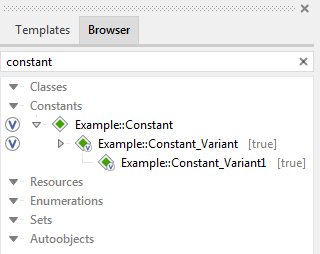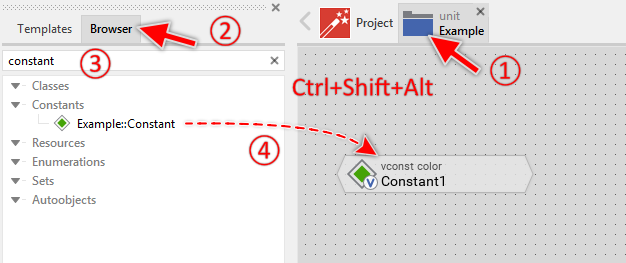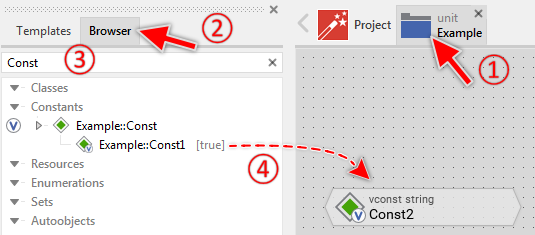Project members: Constant Variant
With a constant variant member you can override another constant member existing in your project. Once overridden, the variant member can retrospectively modify the initialization expressions of the original constant member. Constant variant members are represented in Composer by following bricks. Please note the additional small overlay  in the icon of the brick:
in the icon of the brick:

The derivation of variants provides the fundamental technique to manage several product and design versions within one and the same GUI application. The selection of the appropriate variant occurs automatically depending on the condition specified in the VariantCond attribute of the variant member. Depending on this condition, Embedded Wizard distinguishes between following two types of a variant:
Type |
Short description |
|---|---|
Static |
The condition for the selection of the respective variant results in a value well known at the code compilation time and immutable at the runtime. If this condition is true, the affected variant overrides the original constant member permanently. If the condition is false, the variant has no effect. |
Dynamic |
The condition for the variant selection depends on styles. Since styles can be activated and deactivated individually at the runtime, the overriding changes dynamically. |
A constant member, which has been overridden by a variant member is considered as being multi-variant. You can derive as many variants of an original member as you want. Moreover, one constant variant can override another constant variant resulting in a hierarchy of variants. With the Browser window you can inspect this hierarchy. Please note, a member overridden by a variant is signed in the Browser with an additional small  icon. You can thus recognize multi-variant members easily. Additionally, the corresponding variant condition is shown between a pair of [...] (squared brackets):
icon. You can thus recognize multi-variant members easily. Additionally, the corresponding variant condition is shown between a pair of [...] (squared brackets):

The original constant member is overridden by a variant, which, in turn, is overridden by another variant. Both variants specify as condition true and are thus static.
Create new constant variant
You create a new constant variant by simply deriving it from an existing constant or another constant variant. In the simplest case, if both, the original member and the variant are defined within the same unit, do following:
★First ensure, that the original constant member is selected.
★Then drag and drop the selected member while holding the keys CtrlShiftAlt pressed.

Deriving a new variant from a constant member existing within the same unit.
If the original member is not defined within the same unit, you can use the Browser window:
★First switch to the Composer page for the respective unit member, where you want to add the new variant member.
★Then ensure that the Browser window is visible.
★Within the Browser locate the desired constant member. This can be done easily with Browser's own filter function.
★Select the found constant member in the Browser window.
★Drag and drop the selected member into the Composer area while holding the keys CtrlShiftAlt pressed.

Deriving a new variant by using the Browser window.
Alternatively, you can derive a new variant by using the clipboard functions Copy & Paste:
★First ensure, that the original constant member is selected (e.g. in Composer, Inspector or Browser).
★Press the keys CtrlC or use the menu item to copy the selected constant into the clipboard.
★Eventually switch to the Composer page for the respective unit member, where you want to add the new variant.
★Press the keys CtrlShiftAltV or use the menu item to add a new variant by deriving it from the constant stored in the clipboard.
Name the constant variant
★First ensure, that the constant variant member is selected.
★Press the key F2 or select the menu item .
★Enter the new name in the Inspector window.
Variant members have a global character - they can be accessed from everywhere within your project. To address a variant member, you must always use its full name, which is composed of the unit name, the member is defined inside, and the name of the member itself, both separated by :: (double colon) signs. For example Examples::LabelColorDarkVariant.
Specify the variant condition
The effect of an overriding depends on the condition you specify in the attribute VariantCond of the respective variant member. Per default newly derived variants are configured with the condition true. They overrides thus statically and permanently the original member. You should therefore always review this attribute after deriving a new variant.
Please note, if two variants override the same original member and both variants are configured with the same condition, Embedded Wizard will report a compilation error because of the ambiguity.
Override inherited constant values
The value of a constant variant is determined by the initialization expression specified in its attribute Values. As long as not modified, the attribute shows the expression inherited from the overridden member. When you modify this attribute, the original value is overridden. Please note, the resulting data type of the expression must match the type declaration of the original constant.
If your project is localized for several languages, you can override the expressions for every language individually. If neither the variant nor the original constant specify a particular language specific value, the value from the fallback language Default is used automatically.
Once overridden values can be removed easily by pressing the keys CtrlR when the affected value is selected in Inspector. Thereupon, the value inherited from the original member is restored again.
Duplicate an existing constant variant
You can create any number of copies of an already existing constant variant member.
★First ensure, that the variant member is selected.
★Press the keys CtrlC and CtrlV in succession ...
★... or hold the key Ctrl pressed while you drag and drop the selected variant member.
★Finally rename the just duplicated constant variant member ...
★... and review its variant condition.
You can also Drag & Drop a constant variant member from the Browser into the Composer window and create so a duplicate of the affected member:
★First switch to the Composer page for the respective unit member, where you want to add the duplicate of the constant variant.
★Then ensure that the Browser window is visible.
★Within the Browser window locate the desired constant variant member. This can be done easily with Browser's own filter function.
★Select this constant variant member in the Browser window.
★Drag and drop the selected constant variant member into the Composer:

Duplicating a constant variant by simply Drag & Drop it between the Browser and Composer windows
★Finally rename the just duplicated constant variant member ...
★... and review its variant condition.
Use the constant variant
Embedded Wizard selects the appropriate variant automatically either at the code generation time or just at the moment when the corresponding original constant is evaluated within an expression. Accessing the constant variants individually is not possible. The selection is controlled by the attribute VariantCond.
Delete a constant variant
★First ensure, that the variant member is selected.
★Press the key DEL or select the menu item .
Attributes of a constant variant
The following table shows the complete list of attributes provided by the constant variant member:
Attribute name |
Short description |
|---|---|
Determines the position and the size of a variant member brick within the Composer window. |
|
Determines the data type of a constant member. Please note, this attribute can't be modified in derived variants. |
|
Contains the description for the variant member. |
|
Determines the values for a constant variant member. If not modified, contains the value inherited from the original member. |
|
Determines the condition to activate a particular variant member. |
|
Determines the original constant member to override by the variant member. |
